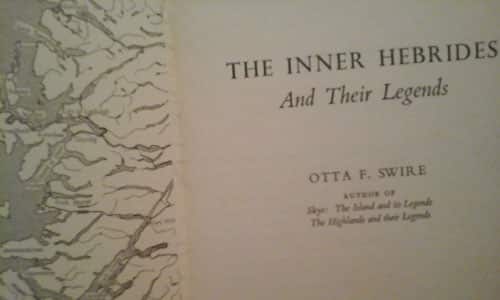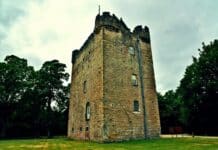MJ STEEL COLLINS looks at the little known Scottish author Otta F Swire and her amazing Herbridean folktales

Otta F Swire has the sort of pedigree you might expect of someone who wrote books on Hebridean folk tales. In the opening pages of Skye: the Island and its Legends (1961)¸ she writes that she was “Born on the site of Tyburn Cross and named after a pirate ancestress who was hanged from her own yard-arm after helping to raid Micklegarth (Constantinople)…” Swire was the author of three books on the Hebrides, including the aforementioned Skye; the others include The Inner Hebrides and their Legends (1964) and The Highlands and their Legends (1963).
Swire was born in 1898 to academic William Tarn and Flora Robertson. Flora came from a Skye family, who owned Orbost House, near Dunvegan. The Skye roots were important to Otta, as she spent much of her childhood on the island being regaled with tales of the island’s folklore by her mother, who had heard them herself from a great aunt who had been born in 1799. As she writes, in Skye, Swire said she wished to preserve the tales for her own children and others who may like to read them.
Swire loved Skye so much, that in 1949, she bought Orbost from her cousin and moved her family, including husband Captain Roger Swire, there. Rather fittingly, Orbost itself was haunted, which Swire documented in her writing. The ghost was of the auditory variety, the sound of a horse and carriage drawing up outside the house.
Swire herself heard it once when she had visitors, though they themselves didn’t hear it. As it is with these things, the ghost moved with the times, switching from horse drawn carriage to a motor car replete with crunching brakes, which annoyed Swire somewhat!
Swire’s prose makes for a very entertaining read. Admittedly, Skye, set out as a kind of guidebook around the Island may be somewhat dated in topography, as it was written over 60 years ago, but as a source of folklore, it’s unbeatable. The tales are told in quite a unique style, with comments, and asides added by Swire.
These range from criticism over rather picturesque thatched cottages in one hamlet having their thatch replaced with slate roofs to the childhood memory of visiting old Skye residents who resolutely refused to give up their traditional Blackhouses for something more modern. There is something of the tongue in cheek in Swire’s writing, which you can imagine was part of the storytelling she heard from her family as a young girl.
She does take a certain amount of glee in the goriness of some tales, such as the rite of burning three cats alive to summon Satan. This never really ended well for the perpetrators, such as the bandits living on Pabay. But you’ll have to read it for yourself, as no one can tell it quite like Otta F Swire.
Neil Gaiman is a fan of Otta F Swire
For a writer with immense storytelling talents, it’s a pity Swire isn’t more recognised. One person who is a fan is Neil Gaiman. He got the title of his novella, The Truth Is A Cave In The Black Mountains, from Swire’s account of a cave in the Cuillin mountains.
In an interview with The New York Times, Gaiman said of his novella, “ I was reading Otta F. Swire’s book on the legends of the Isle of Skye. She mentioned that there was a cave in the black mountains, where it was said you could go and bring back gold. You could go into the cave, and you could go as many times as you wanted to, but each time, it would eat a little bit of your soul, and you would become more evil. I’d never run into a legend like that anywhere.”
Gaiman was also inspired to write a poem In Relig Oran, through his reading of Swire.
The fact that Swire, who passed away in 1973, is such an influence on the highly acclaimed Gaiman, says a lot. Her work is something that stays in your subconscious long after reading. Sadly, none of her work is in print.
Those wanting to read about the fate awaiting those trying to summon Satan by burning cats alive, what happens when Fingalian giants throw stones, the morose ghosts of clan warfare and the Daoine Sidhe, are best advised to check in with a good second hand book dealer. You won’t regret it.







